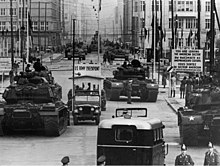
Back أزمة برلين 1961 Arabic Берлинска криза Bulgarian Crisi de Berlín de 1961 Catalan Berlin-Krise German Κρίση του Βερολίνου (1961) Greek Berlina krizo (1961) Esperanto Crisis de Berlín de 1961 Spanish 1961. aasta Berliini kriis Estonian 1961eko Berlingo krisialdia Basque بحران ۱۹۶۱ برلین Persian
| Berlin Crisis of 1961 | |||||||
|---|---|---|---|---|---|---|---|
| Part of the Cold War | |||||||
 U.S. M48 tanks face Soviet T-55 tanks at Checkpoint Charlie, October 1961. | |||||||
| |||||||
| Belligerents | |||||||
|
Supported by: |
Supported by: | ||||||
| Commanders and leaders | |||||||
|
|
| ||||||
The Berlin Crisis of 1961 (German: Berlin-Krise) was the last major European political and military incident of the Cold War concerning the status of the German capital city, Berlin, and of post–World War II Germany. The crisis culminated in the city's de facto partition with the East German erection of the Berlin Wall.
The Berlin Crisis began in June 1961 when Soviet Premier Nikita Khrushchev, meeting with US President John F. Kennedy at the Vienna summit, reissued an ultimatum which demanded the withdrawal of all armed forces from Berlin, including the Western armed forces in West Berlin. The East German government also sought a way to stop its "brain drain" as its population fled west through Berlin, made possible by the city's four-power status and the allowance of free travel. No agreement was reached and in August 1961, with Khrushchev's backing, East German leader Walter Ulbricht ordered the closing of the border and the construction of a wall around West Berlin. A brief stand-off between American and Soviet tanks occurred at Checkpoint Charlie in October following a dispute over free movement of Allied personnel; the confrontation ended peacefully after Khrushchev and Kennedy agreed to withdraw the tanks and reduce tensions.